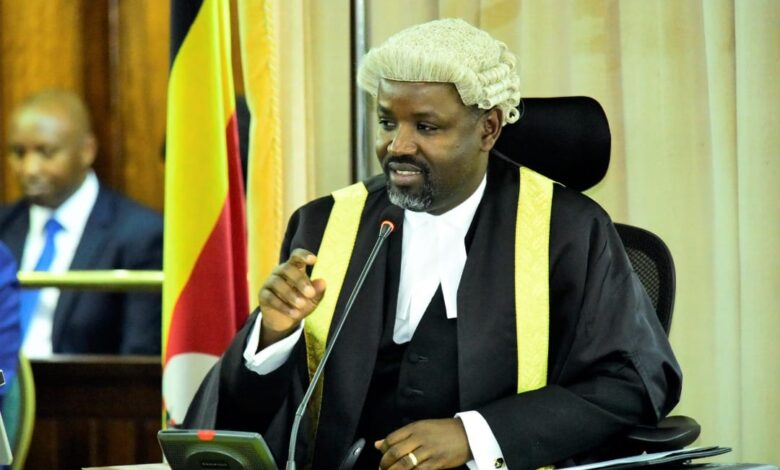Tayebwa asks MPs to provide evidence on Muhoozi’s alleged anti-civilian rule remarks
On his side, the deputy attorney general, Jackson Kafuuzi defended Muhoozi Kainerugaba's utterances, saying that the Chief of Defence Forces has freedom of expression and a right to form an opinion like all Ugandans, even when the Constitution bars serving officers from engaging in partisan politics.

Deputy Speaker Thomas Tayebwa has tasked MPs accusing Muhoozi Kainerugaba of threatening never to allow any civilians from ever ruling in Uganda, to table evidence before Parliament.
Saying this Tayeba was claiming that he isn’t on social media and hasn’t come across the statements that are being attributed to the Commander in Chief.
“Some of us aren’t on social media, where are these statements? Because it seems there are things being referred to, there are statements that some people read some of us haven’t read. If one could lay it on the table, it could help some of us. I am just asking honestly because if we take it that everyone is on social media, waiting for statements, so if we can lay on the table,” remarked Tayebwa.
On his side, the deputy attorney general, Jackson Kafuuzi defended Muhoozi Kainerugaba’s utterances, saying that the Chief of Defence Forces has freedom of expression and a right to form an opinion like all Ugandans, even when the Constitution bars serving officers from engaging in partisan politics.
However, Wilfred Niwagaba, shadow attorney general questioned Kafuuzi’s legal prowess wondering how a top government advisor would defend utterances made by Muhoozi, which he says violate the constitution and other provisions in the Uganda People’s Defence Forces Act, the same force that he commands.
“All along I thought I went to the same Law School as my learned friend, until today. Well, I am not saying that I am disappointed because he has expressed his opinion, but I think it is vulgarizing a very important matter that Ssemujju has raised. That a serving military officer, who is at the helm of the UPDF currently, comes out and makes statements that not only contravene Article 208 of the Constitution, but also the UPDF Act itself. And the Deputy Attorney General comes and defends that kind of conduct as part of the freedoms of expression and opinion, well knowing that some freedoms are subject to the law,” said Niwagaba.
Medard Sseggona (Busiro East) informed parliament that he went to the same law School and high school with Kafuuzi and he isn’t disappointed with the opinion Kafuuzi has rendered to Parliament about Muhoozi’s utterances.
Sseggona said he was only restrained by the reprimand he would have received from the Deputy Speaker, had he described Kafuuzi’s legal opinion as “stupid”.
“I went to the same, not only Law School, but the same High School as the Deputy Attorney General, I am not disappointed because one core thing we were taught is to express the opinion and the Supreme Court of this land has ruled in Andrew Mwenda and Charles Onyango Obbo Vs Attorney General that the person has a right to express, even a wrong opinion, I was going to say, outside Parliament, even a stupid opinion, but fearing you Deputy Speaker, I opted to refrain,” noted Sseggona.
Sseggona also asked the Deputy Speaker to subject Muhoozi’s remarks to a parliamentary investigation arguing that remarks that the army would never allow any civilian to rule as president threatens the safety of all Ugandans.
“I thought that the right way of dealing with this would be referring this matter for an investigation irrespective of who is involved because it is about our lives, it is about the safety of everybody in this country, it is a matter that should be investigated,” proposed Sseggona.
However, deputy speaker Thomas Tayebwa rejected the proposal to subject Muhoozi’s utterances to a Parliamentary investigation arguing, “The UPDF has its own Code of Conduct, has its own disciplinary procedures. If any member of the UPDF violates their code of conduct, they are subjected to their disciplinary action. I have seen Generals going there, I have seen senior officers going there.”
“So, I don’t want Parliament to turn itself into an investigative body, before the Institution can utilize its own mechanisms in case there is a problem. Really, I am not going to refer this matter to the Committee for investigation.”
Uganda’s opposition has long accused Museveni of seeking to impose a monarchy on Uganda — a claim the president denies.
Museveni, 80, has ruled Uganda since 1986 and has changed the constitution twice to extend his rule.
Human rights activists and his political opponents including pop star turned politician Bobi Wine have long accused Museveni of using security forces to jail, intimidate or torture opposition supporters. Museveni denies such accusations.







